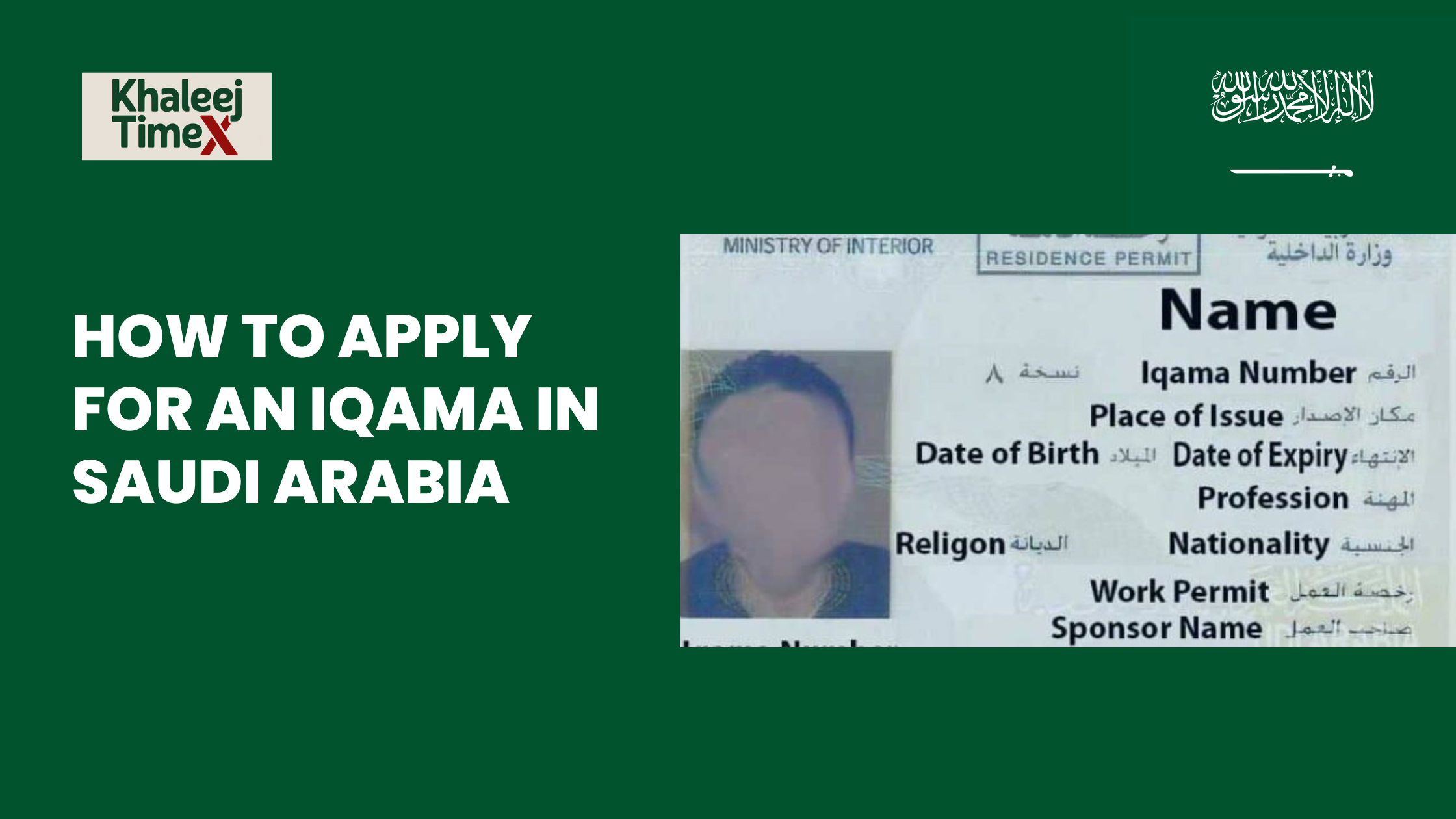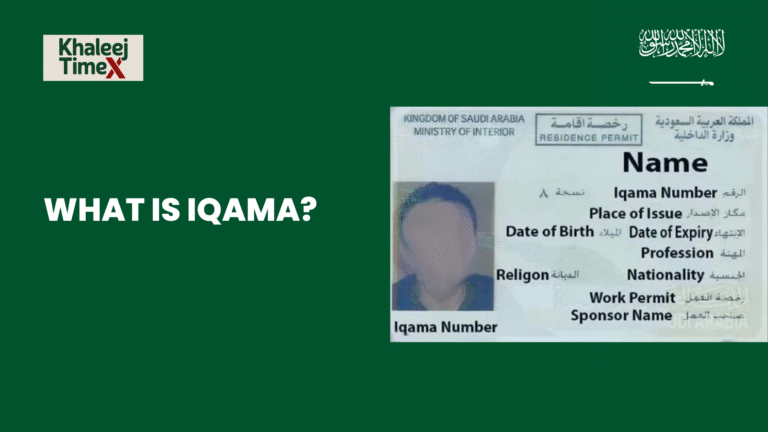How to Apply for an Iqama in Saudi Arabia: A Step-by-Step Guide

Hey there! Moving to Saudi Arabia for work? That’s a bold move, and I’m here to help you navigate one of the most critical steps: getting your Iqama. This residence permit is your ticket to legally live and work in Saudi Arabia, and it’s a must-have for everything from renting a place to getting a Saudi SIM card.
Let’s break down the Iqama application process into simple, actionable steps, sprinkle in some real talk, and answer those burning questions you’ve got. Ready? Let’s do this.
What is an Iqama?
An Iqama is your official identity card in Saudi Arabia, issued by the Saudi Ministry of Interior through the General Directorate of Passports (Jawazat). It’s not just a piece of paper—it’s proof that you’re legally allowed to work in the Kingdom and reside there as an expatriate.
Think of it as your all-access pass for living in Saudi Arabia. Without it, you’re stuck in limbo, unable to do basic things like sign a lease or access certain government services. It’s typically valid for one to two years and must be renewed annually.
Why You Need an Iqama
The Saudi Iqama is non-negotiable for foreign nationals. It’s your residence permit that lets you:
- Rent an apartment or house.
- Open a bank account or get a Saudi SIM.
- Access healthcare and other services.
- Prove your legal status to authorities.
It’s tied to your employer (your sponsor), and you need to carry it at all times. Losing it or letting it expire can lead to fines or even deportation, so it’s important to keep your Iqama up to date.
Step-by-Step Guide to Obtaining an Iqama
Here’s how to get your Iqama in Saudi Arabia. Your employer does most of the heavy lifting, but you’ll need to stay on top of a few things.
Step 1: Secure a Job with a Sponsor
To obtain an Iqama, you need a job with a company in Saudi Arabia that’s registered to sponsor foreign workers. This is non-negotiable—every expatriate needs a sponsor (usually your employer) to apply for the Iqama.
You’ll sign an employment contract detailing your job role, salary, and benefits. This contract is a key part of the required documents for your Iqama application.
- Pro Tip: Make sure your contract is clear and certified by the Saudi Chamber of Commerce or Ministry of Foreign Affairs. It’s your foundation for the whole process.
Step 2: Complete a Mandatory Medical Examination
Before you can apply for a work visa and Iqama, you need to pass a medical examination. This can often be done in your home country at an approved medical center.
The exam checks for serious diseases like TB, cholera, and HIV/AIDS, plus eyesight and hearing tests. If you test positive for certain conditions (like HIV), you may face deportation, so this step is critical.
- What You Need: A medical certificate proving you’re in good health.
- Where to Check: You can verify your test results online via the Ministry of Health website.
Step 3: Get a Work Visa
Your employer will apply for a work visa on your behalf through the Saudi Ministry of Foreign Affairs or an authorized visa service center. This is separate from the Iqama but necessary to enter Saudi Arabia. Once approved, you’ll get a visa authorization number, which is essential for the Iqama process.
- Timeline: This step usually takes about two weeks, depending on your role and the company’s requirements.
Step 4: Enter Saudi Arabia
With your work visa, you can travel to Saudi Arabia. You must enter Saudi Arabia within the visa’s validity period (usually 90 days). Once you’re in the Kingdom, your employer will initiate the Iqama application process. You’ve got 90 days from arrival to complete the Iqama issuance, so don’t dawdle.
Step 5: Visit a Jawazat Office for Biometrics
After arriving, you’ll need to visit a Jawazat office (part of the General Directorate of Passports) to provide biometric data—fingerprints and a photograph. This is a mandatory step, and you’ll need to book an appointment in advance.
- What to Bring: Your passport, a copy of it, and a couple of passport-sized photos.
- Why It Matters: No biometrics, no Iqama. It’s that simple.
Step 6: Submit Documents and Receive Your Iqama
Your employer will submit all required documents to the Ministry of Labor and Social Development or the Jawazat office. These typically include:
- A copy of your passport.
- 2–4 passport-sized photos.
- Your medical certificate.
- Your employment contract.
- Proof of medical insurance (often arranged by your employer).
Once everything is processed and approved, you’ll receive your Iqama. The application process can take anywhere from 1 day to 4 weeks, depending on how quickly everything is submitted.
- Pro Tip: Check the status of your Iqama through the Absher platform, a Saudi government service for managing residency and other permits.
Costs of Getting an Iqama
The Iqama isn’t free, but your employer typically covers most costs. Here’s a breakdown of the fees based on available data:
| Fee Type | Cost (Saudi Riyals) | Notes |
|---|---|---|
| Iqama Fee (1 year) | SR 650 | Annual fee for issuance or renewal |
| Iqama Fee (9 months) | SR 488 | For shorter-term permits |
| Iqama Fee (6 months) | SR 325 | For shorter-term permits |
| Iqama Fee (3 months) | SR 163 | For shorter-term permits |
| Insurance Fee | SR 600 | Annual medical insurance |
| Gosi Fee | SR 800 | Social security contribution |
| ATM Card Fee | SR 200 | For setting up a Saudi bank account |
| Dependent Fee | SR 400/month | Per dependent (e.g., spouse, children) |
- Who Pays?: Your employer usually covers these fees, but check your contract—some may expect reimbursement.
- Additional Costs: You might need to pay for the medical exam (varies by country) and other minor fees like document attestation.
For the latest Iqama fees in Saudi Arabia, check KSA Expats.
Key Things to Know
- 90-Day Deadline: You must complete the Iqama process within 90 days of arriving in Saudi Arabia, or you risk fines or deportation.
- Renewal Process: The Iqama is typically valid for one year and must be renewed at least 3 days before expiry. Your employer should handle this, but stay on top of it.
- Sponsorship Rules: Your Iqama is tied to your employer. Changing jobs requires transferring your sponsorship, which involves additional paperwork.
- Lost Iqama: If you lose your Iqama, report it to your sponsor and the police within 24 hours to avoid a SR 1,000 fine. You’ll need a police report, a copy of your Iqama, your passport, and photos to apply for a replacement at the Jawazat office.
Family Sponsorship
Got a spouse and children? After your Iqama is approved, you can apply for family sponsorship to bring them to Saudi Arabia. Your employer will assist with this, but you’ll need to cover additional dependent fees (SR 400 per month per dependent). The process involves similar steps, like medical exams and document submission.
FAQs
Here are answers to some common questions about the Iqama in Saudi Arabia to clear up any confusion.
How much does Iqama cost?
The Iqama fee for one year is around SR 650, but additional costs like insurance (SR 600), Gosi (SR 800), and others can push the total to a few thousand Saudi Riyals. Your employer typically covers these, but always confirm with them.
Can I get Iqama without a sponsor?
No, a sponsor is required for a standard Iqama. For most expatriates, this is your employer. There are exceptions for certain groups, like investors applying for premium residency, but for regular workers, a sponsor is mandatory.
How many days will it take to get Iqama?
The Iqama application process can take anywhere from 1 day to 4 weeks, depending on how quickly documents are submitted and processed. Delays can happen if paperwork is incomplete, so double-check everything.
How many years is the Iqama validity?
The standard Iqama is valid for one year, though some special types (like premium residency) can last longer, up to 10 years or even permanently. Most workers will need to renew annually.
Who pays for Iqama?
Your employer usually pays the Iqama fees as part of your employment package. However, some contracts may require you to reimburse them, so read the fine print.
How much is the Iqama fee in Saudi Arabia 2025?
As of now, the one-year Iqama fee is SR 650, but fees can change. For 2025 updates, check official Saudi government portals like Absher or consult your employer.
Tips for a Smooth Iqama Process
- Stay in Touch with Your Employer: They’re your sponsor, so keep communication tight to avoid delays.
- Double-Check Documents: Missing or incorrect paperwork can stall your Iqama issuance.
- Use Absher: Register on the Absher platform to track your Iqama status and manage renewals.
- Plan for Renewal: Start the renewal process early to avoid expiry issues.
- Know Your Rights: Familiarize yourself with Saudi labor laws via VelocityGlobal to ensure compliance.
What Happens if You Don’t Get an Iqama?
Failing to obtain an Iqama within 90 days or letting it expire can lead to serious consequences:
- Fines starting at SR 1,000 for late renewal or loss.
- Potential arrest or deportation for non-compliance.
- Inability to access services like banking or healthcare.
It’s critical to stay on top of the Iqama process and work closely with your employer to ensure everything is done right.
Getting an Iqama in Saudi Arabia is your key to starting a new chapter in the Kingdom. It’s a process that requires some patience, but with a reliable employer and the right documents, you’ll be holding your Iqama in no time. Whether you’re moving for a job or bringing your family, this residence permit opens the door to life in Saudi Arabia.
Keep your Iqama safe, renew it on time, and you’re all set to thrive in the Kingdom. Got more questions? Hit up your employer or check Absher for the latest updates. Here’s to your new adventure in Saudi Arabia!


